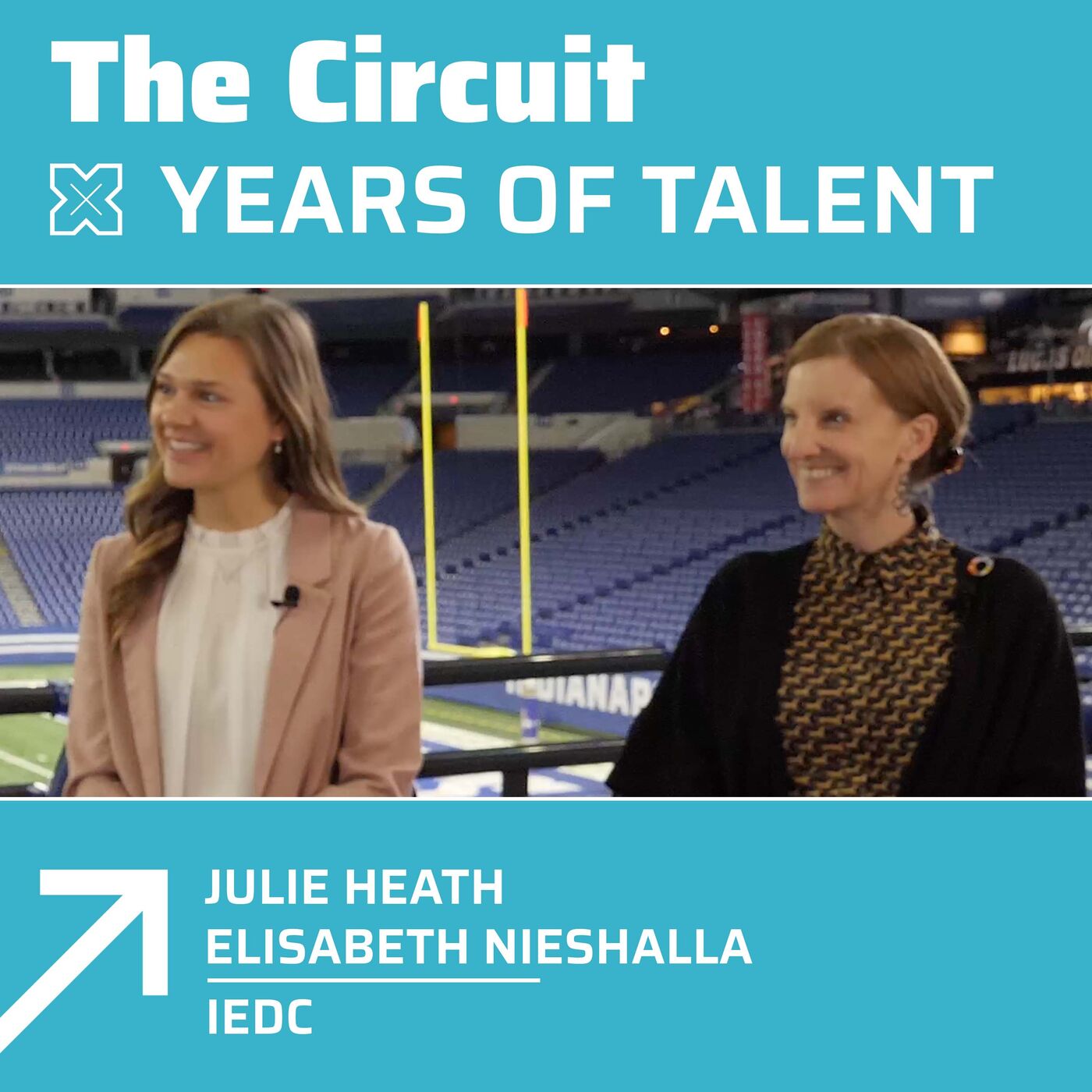X Years of Talent | Indiana Economic Development Corporation: Julie Heath, Elisabeth Nieshalla
- 0.5
- 1
- 1.25
- 1.5
- 1.75
- 2
Merillat Flowers (00:01):
10 years ago, roughly half of Indiana's college graduates remained in the state upon graduation, this number was even lower for STEM degrees, as many of these students found opportunities and offers in major tech hubs. It was in the face of this problem that TechPoint launched the Extern program, a 10 week internship program that employs hundreds of college students in roles at local tech companies in this circuit mini-series, 10 years of talent, TechPoint interviews the major players in Indiana's tech landscape from talent organizations to the people who were there at the beginning of extern. We look back at the past decade of Indiana's talent initiative and look towards the future of Indiana's tech workforce. Well, Julie, Elizabeth, thanks so much for sitting down with us today.
Elisabeth Nieshalla (01:13):
Absolutely.
Julie Heath (01:13):
You for having us.
Merillat Flowers (01:13):
Absolutely. So for those folks that are not yet familiar with the idc, will you start just by telling us a little bit about what you do and what the mission overall is?
Julie Heath (01:22):
I E D C is the Indiana Economic Development Corporation. And, uh, economic development is ultimately about community wellbeing through economic health. So we have the unique position of being able to use entrepreneurship as our tool for increasing economic health and community wellbeing. And so that's part of the five E strategy that, uh, secretary Brad Chambers put forward. Awesome.
Merillat Flowers (01:46):
Well, we're so glad that you're doing that really important work and feel very lucky to be in partnership with you as we do that. Which, speaking of partnerships, obviously we just announced a new partnership with you all, um, to support, uh, early stage startups with the Extern program. So would love to have you talk about the origins of the idea where the, where it came from and why externs a good vehicle right now to do this work.
Elisabeth Nieshalla (02:09):
Sure. So this summer I was blessed to have the opportunity to be part of the IDCs, who's your economic fellowship program, as the Entrepreneurial Ecosystems Fellow. And as part of the program, the Secretary Chambers charged us with the question, what would make you want to stay in Indiana after graduation? Focusing on talent retention, keeping our students here, um, even after they graduate. So, um, as we were thinking about this, myself and the small Business Development Center fellow, uh, Josh Ackerman, your brainstorming, what are, what are the really essential factors that make people decide where they wanna live, where they want to work? The first is quality jobs. Mm-hmm.
Elisabeth Nieshalla (03:07):
So through the research that we did, we came across extern. Um, you all are already doing amazing in the job, um, category of providing quality internships that often lead to jobs or create connections that lead to jobs. Um, the, the community engagement of, um, taking them to see football games or, or baseball games. Um, and, and showing Indiana as a really quality place to live, and then fostering that community among the interns, and also they can create that community at the places that they work. Um, so y'all are already doing so many things. Well, and then we saw an opportunity to bring in more of the entrepreneurial side mm-hmm.
Merillat Flowers (04:08):
When we think about this extern partnership, there's obviously lots of different types of companies that the program could support, um, mid-size, large size employers, but there's something really compelling about startups and, and love to have you speak more about that and why the purpose of this, um, initiative will focus on that. Yeah.
Julie Heath (04:24):
Well, we're really excited to work with you because of the success of this program. And we wanna increase the, the program's access, access to the program for young companies. And the reason for that is because we have new data showing that it's young companies, companies under five years of age, the drive net job creation mm-hmm.
Merillat Flowers (05:07):
Yeah. I'm so excited by that concept. And I think as in talking with you all, as we poured over our historical data with the program, we found that that was exactly the gap we've been seeing. And so I'm, I think the opportunities that will be open for both employers and students because of this funding will, will be tremendous. What do you think, uh, success looks like in the first year of the partnership?
Elisabeth Nieshalla (05:28):
So in this, in this first year, we hope to bring in 50, uh, externs and match them with 50 startups. Awesome. Um, so that's, that's goal number one. Um, goal number two would just to make the program likely said more accessible for startups, make it more feasible for them to gain access to this young talent. And then ultimately, uh, we would hope to retain the talent. Right. Absolutely. Um, externs in Indiana help them see that Indiana is a wonderful place to work, a wonderful place to live and gain exposure to, um, all of the wonderful things we have going with entrepreneurship here. Mm-hmm.
Merillat Flowers (06:11):
Okay. Julie, so if you could wave your magic wand and bring in all of the perfect employers who fit this new initiative Yeah. What would those look like for
Julie Heath (06:19):
You? Okay. These companies are probably two or three years old. Yeah. Maybe they have 2, 3, 4, 5 employees. They're in a sub-sector that we would consider, uh, an economy of tomorrow sub-sectors. So maybe it's Industry 4.0, maybe it's, um, I'm thinking of Aros, which is a company down near Bloomington, um, which is innovating in the copper space, in, in conductivity in the way copper is used. So that would be, uh, an ideal company. Another one might be qualified with the way they think about interviewing and making the interviewing process more effective. So companies, companies that are maybe two or three years old and are looking for interns.
Merillat Flowers (07:04):
Awesome. So when you think about students working for startups, what unique opportunities do you think will be available for them?
Elisabeth Nieshalla (07:11):
Gosh. Well, I think for students like myself who have entrepreneurial aspirations, working for a startup is a perfect training ground. Um, for one day, you know, owning your own company, starting that process and going through what it looks like to, to go from an ideal stage to that first paying customer, um, and, and living and breathing, that I think is so valuable. Yes.
Julie Heath (07:36):
Yes. I can confirm that as employee number one, at a tech startup, I learned that you have to wear all the hats, and it's an incredible way to learn, uh, especially if you have aspirations of starting your own company one day. Yeah. Awesome.
Merillat Flowers (07:50):
It'll be a cool journey for the students that are involved, I think. Yes. Yeah.
Julie Heath (07:54):
Awesome.
Merillat Flowers (07:54):
Well said. I, Elizabeth, this is so cool because I think your unique role in this whole initiative and the story of you currently being an intern, um, supporting an intern program is, I'll never get over how cool that is. Um, overall, and I, you know, after your experience and the work that you did this summer and the different initiatives that you looked at as a college student, thinking about your future opportunities, what do you think is really important for the state to keep in mind? And what are other initiatives that we should be supporting?
Elisabeth Nieshalla (08:22):
Sure. Well, I think number one, um, being an intern and having such a great experience at the I E D C, having an internship that provides real experience, um, being in the professional world mm-hmm.
Merillat Flowers (09:58):
I think those are excellent points and a good reminder of how much we need to be communicating to our college students about the opportunities. There's a lot going on in the state, and a lot of it's about getting the message out there. Yeah. So it's awesome. Well, as we look to the next 10 years of talent growth in innovation and entrepreneurship space, what do you all see as the biggest opportunities for our state, um, and for the growth, and particularly what's on the horizon in that space for the I E D C?
Julie Heath (10:23):
Yeah. Well, we know there's a lot of change in the economy of the future. Yeah. So, as industries change, as new industry sub-sectors arise, we, we realize that the pace of change is increasing. So what that means is the entrepreneurial mindset, seeing problems as opportunities to solve, that's key.
Elisabeth Nieshalla (10:41):
That's
Julie Heath (10:41):
And the way that works out with that net new job data is that perhaps the, the junior of today will be in a job that is not in existence yet. How do you train up for a job that doesn't exist yet, but it'll be the job you have in three years. That's, that's, that's a quandary, right? So having the entrepreneurial mindset, realizing that mentorship is a key part, it's gonna be important for our short game, but it's also gonna be important for our long game in terms of economic health.
Merillat Flowers (11:11):
Awesome. Excellent. Well, it's an exciting, uh, future on the horizon that I know with all the different work that's happening in the state and all of the unique partnerships that are taking place. Hopefully ours will be a great example of that as we go forward. So thanks for coming to talk with us today.
DESCRIPTION
10 years ago, roughly half of Indiana's college graduates remained in the state upon graduation. This number was even lower for STEM degrees, as many of these students found opportunities and offers in major tech hubs.
It was in the face of this problem that TechPoint launched the Xtern program, a 10 week internship program that employs hundreds of college students in roles at local tech companies.
In this Circuit mini-series, X Years of Talent, TechPoint interviews the major players in Indiana's tech landscape from talent organizations to the people who were there at the beginning of Xtern. We look back at the past decade of Indiana's talent initiative and look towards the future of Indiana's tech workforce.
In this episode, we sit down with Julie Heath, Vice President of Entrepreneurial Ecosystems at the Indiana Economic Development Corporation. Along with Elisabeth Nieshalla, Taylor University student and Entrepreneurial Fellow at IEDC. They talk about the role talent plays in the success of Indiana's entrepreneurial ecosystem and IEDC's new partnership to bring Xtern to young startups.


